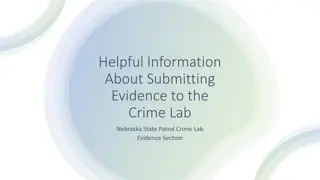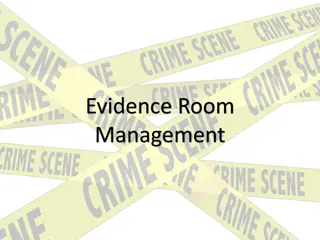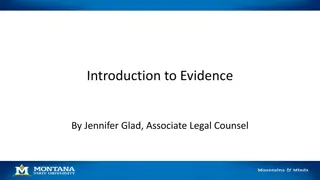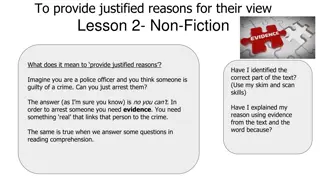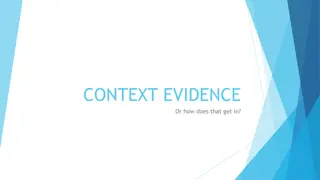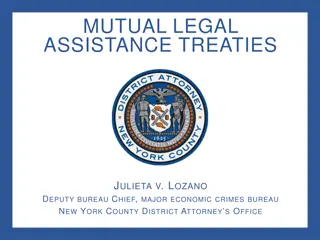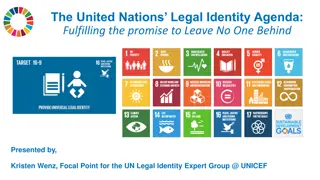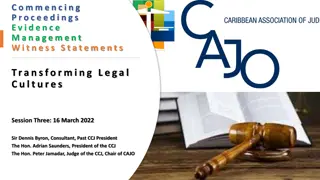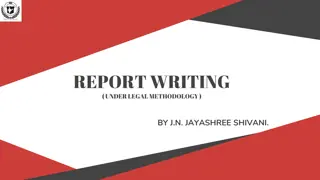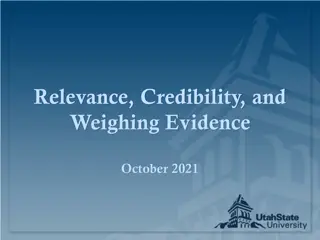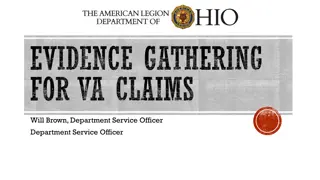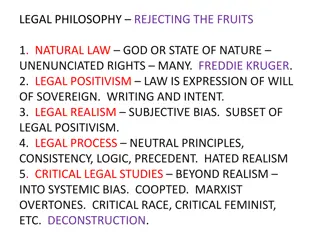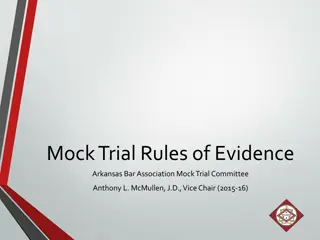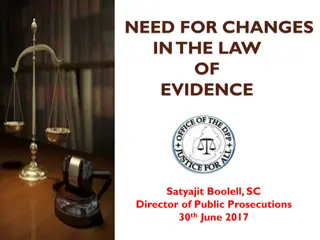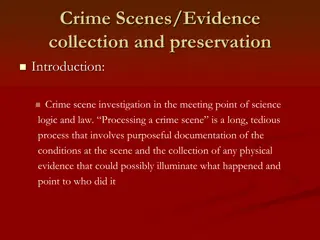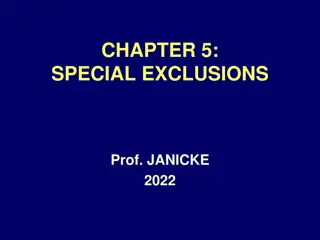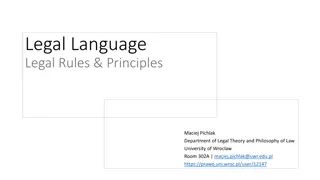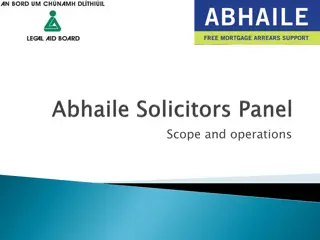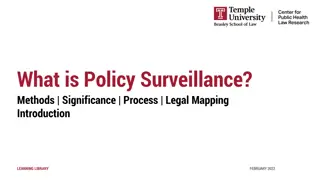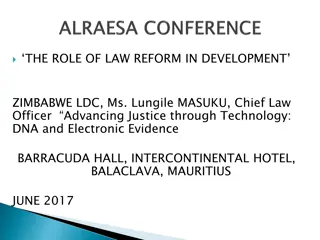The Role of Artifacts and Evidence in Educator Evaluation and Support
Exploring the role of artifacts and evidence in educator evaluation, this content covers the three categories of evidence required by the Oregon Framework. It delves into the efficient process that reduces redundancy, essential components of SLG goals, and the types of evidence relevant to professio
0 views • 15 slides
Understanding Impression Evidence Collection in CSI Investigations
Impression evidence plays a crucial role in investigations, including shoeprints, tool marks, tire tracks, bite marks, and riffling marks on bullets. This evidence can be collected in 2D using photography or tape lifts, and in 3D through casting methods. Differentiating between class and individual
0 views • 21 slides
Helpful Information About Submitting Evidence to the Crime Lab.
Helpful information about submitting evidence to the Nebraska State Patrol Crime Lab's Evidence Section. Learn about the NSP 750 Evidence Submittal Form, submission process, and guidelines for resubmissions. Ensure all necessary details are provided for proper analysis of evidence.
5 views • 16 slides
Illegally obtained evidence
Illegally obtained evidence refers to evidence acquired through unlawful means, such as searches without warrants or extraction under duress. The Fruit of the Poisonous Tree doctrine renders evidence inadmissible if derived from illegally obtained evidence. The Exclusionary Rule prohibits the use of
2 views • 30 slides
Evidence Room Management
Explore the intricacies of evidence room management in a law enforcement setting, including the roles of individuals like Greg Van Buskirk, differences in crime scene management between large and small departments, the distinction between property and evidence, the importance of maintaining chain of
0 views • 8 slides
Understanding the Difference Between Legal Information and Legal Advice
Legal information provides facts about the law and legal processes, while legal advice offers guidance on courses of action to further interests. Legal information is like the rules of a game, explaining basics, while legal advice is akin to the strategies for winning. This article explores the dist
0 views • 12 slides
Understanding Evidence in Investigations
Learn about the principles and types of evidence in investigations, including inculpatory and exculpatory evidence, physical, documentary, demonstrative, and verbal evidence. Explore sources of evidence and the significance of collecting relevant information to ensure a fair investigative process.
0 views • 14 slides
Providing Justified Reasons in Reading Comprehension
Providing justified reasons in reading comprehension involves using evidence from the text to support one's answer, similar to presenting evidence in a legal case. Just as a police officer needs evidence to make an arrest, readers need textual evidence and the word "because" to support their respons
0 views • 11 slides
Understanding Context Evidence in Legal Proceedings
Context evidence in legal proceedings refers to evidence of acts not charged in the indictment, used to provide a background for understanding specific allegations. This type of evidence is often relied upon by the prosecution to explain events or behaviors that may seem isolated or surprising. It i
1 views • 13 slides
Overview of Mutual Legal Assistance Treaties in Criminal Matters
Mutual Legal Assistance Treaties (MLATs) play a crucial role in facilitating international cooperation in criminal investigations and proceedings. They allow for the exchange of evidence, documents, and other forms of legal assistance between countries. MLATs come in various types, such as bilateral
0 views • 13 slides
United Nations Legal Identity Agenda: Achieving SDG 16.9
The United Nations Legal Identity Expert Group (LIEG) aims to close the global legal identity gap by over 300 million within four years. The group focuses on implementing a life-cycle approach to legal identity, starting from birth, to ensure no one is left behind. The structure and strategy of LIEG
0 views • 10 slides
Transforming Legal Cultures: Enhancing Legal Proceedings, Evidence Management, and Witness Statements
Expert insights on transforming legal cultures through effective management of legal proceedings, evidence, and witness statements. Join Sir Dennis Byron and The Hon. Adrian Saunders in Session Three on 16 March 2022 for valuable perspectives on this crucial topic.
0 views • 71 slides
Role and Responsibility of Legal Aid Panel Lawyers Presentation
The presentation by Rajasthan State Legal Services Authority discusses the vital role of legal aid panel lawyers in providing legal services to the marginalized and weaker sections of society. It emphasizes the responsibilities of panel lawyers in offering competent legal assistance, spreading legal
0 views • 22 slides
Understanding Evidence-Based Medicine and Clinical Decision-Making
European Patients Academy on Therapeutic Innovation emphasizes the importance of Evidence-Based Medicine (EBM) in providing optimum clinical care. EBM involves systematic review and utilization of clinical research for informed decision-making, benefiting patients in disease management and treatment
7 views • 20 slides
Understanding Legal Report Writing Methods
A report is an organized document presenting information, analysis, and evidence to address a specific issue. In legal methodology, reports play a crucial role in documenting judicial decisions, research outcomes, and legal principles. This article explores the types of reports, the research process
0 views • 15 slides
Enhancing Quality Standards of Legal Clinical Education in Ukraine
The Association of Legal Clinics of Ukraine (ALCU) is dedicated to promoting high-quality legal clinical education in the country. They have established standards and assessment tools to ensure the effectiveness of legal clinics, with a focus on providing free legal aid and raising legal awareness.
1 views • 10 slides
Understanding Relevance, Credibility, and Weighing Evidence in Decision-Making
Explore the importance of relevance and credibility in evidence assessment, the role of hearing panels in evaluating evidence fairly, and the responsibilities they hold. Learn about presenting relevant evidence, policy analysis, and identifying irrelevant evidence to ensure a thorough review process
6 views • 32 slides
Mastering Claims, Evidence, and Warrants for Persuasive Writing
Understanding the concepts of claims, evidence, and warrants is crucial for constructing persuasive arguments. Claims represent positions to persuade, evidence supports claims with facts, and warrants bridge the gap between evidence and claims. An exercise is outlined to help practice forming claims
0 views • 8 slides
Understanding Biased Assimilation and Attitude Polarization in Social Disputes
People with strong opinions on complex social issues tend to interpret evidence in a biased manner, accepting confirming evidence readily while subjecting disconfirming evidence to critical evaluation. This can lead to increased polarization rather than narrowing of disagreement when exposed to the
0 views • 20 slides
Access to Justice Through Public Legal Education in Alberta
The Centre for Public Legal Education Alberta (CPLEA) is a not-for-profit organization offering plain language legal education and information to empower individuals in understanding their rights and responsibilities. Public Legal Education (PLE) helps people address legal issues independently by pr
0 views • 20 slides
Transformation of Quality Assessment Framework in Healthcare
The healthcare quality assessment framework is evolving with a new strategy focused on data-led, people's experiences, care integration, and safety culture. The current framework is transitioning towards a new approach by late 2023, incorporating separate registration and monitoring processes, five
0 views • 14 slides
Understanding Circumstantial Evidence in Legal Proceedings
Circumstantial evidence plays a crucial role in legal proceedings, allowing one to infer facts based on surrounding circumstances rather than direct proof. This type of evidence can be powerful in establishing the guilt or innocence of a person accused of a crime, complementing direct evidence for a
0 views • 39 slides
Understanding Evidence Gathering for VA Claims with The American Legion Department of Ohio
Evidence is crucial for VA claims, and it can come in various forms such as documents, written statements, photos, and video recordings. The framework for evaluating evidence includes factors like relevance, competence, credibility, and weight. Understanding the types of evidence, forms of relevance
0 views • 14 slides
Understanding Legal Philosophy: Rejection of Traditional Frameworks
Explore various schools of legal philosophy such as natural law, legal positivism, legal realism, legal process, and critical legal studies. Discover the evolution of civil rights through key amendments and landmark cases shaping modern legal interpretations.
0 views • 194 slides
Understanding Mock Trial Rules of Evidence
Mock Trial Rules of Evidence are crucial for determining the admissibility of testimony and evidence in a trial setting. Students preparing for cases need to assess evidence admissibility, make timely objections, and be prepared to defend testimony. The rules cover objections, specific objections ty
0 views • 36 slides
Need for Changes in the Law of Evidence: Perspectives and Reforms
Information by which facts are proved forms the essence of the law of evidence, regulating how facts are established in courts. This article discusses the exclusionary ethos, statutory reforms, challenges with hearsay evidence, and examples of reforms from different countries like England, Wales, Au
0 views • 18 slides
Understanding Legal Aid and Access to Justice
Legal aid is a state-funded support system aimed at providing legal assistance to individuals who cannot afford legal help. However, the availability of legal aid has been significantly impacted over the years by various acts and changes in the legal system. The unmet need for legal services arises
0 views • 22 slides
Legal Aid Provision and Access: Challenges and Solutions
Rebecca Rayment, a former Legal Aid lawyer and current Chief Executive of Manuel Bravo Project, addresses the complexities of accessing legal assistance, specifically focusing on Legal Aid for vulnerable asylum seekers and migrants. The presentation delves into the current legal advice provision, ch
0 views • 15 slides
Understanding Legal Reasoning: A Comprehensive Insight
Legal reasoning involves navigating through gaps, inconsistencies, and ambiguities in the law to interpret and apply legal norms effectively. This process of validation, interpretation, and application helps legal practitioners optimize the legal system and adapt it to real-life cases. The presentat
0 views • 21 slides
Iowa Legal Aid: Free Legal Assistance for Low-Income Iowans
Iowa Legal Aid offers free legal assistance to low-income Iowans, covering a range of civil legal issues such as family law, housing, consumer rights, and more. Services are provided through regional offices across Iowa, with easy application processes and multilingual support available. Learn how t
1 views • 26 slides
Understanding the Finnish Legal Profession of Attorneys-at-law
Attorneys-at-law in Finland are highly trained legal professionals who play a crucial role in upholding the rule of law. Only members of the Bar Association can hold this title, ensuring quality legal services for clients. The profession includes different roles such as licensed legal counsel, publi
0 views • 16 slides
Evolution of Legal Aid: From Inception to Present Challenges
The evolution of legal aid from its establishment in 1949 to the current challenges faced post the Legal Aid, Sentencing and Punishment of Offenders Act 2012 has been marked by changes in funding, administration, and accessibility. Despite initial state-funded schemes and subsequent reforms, recent
0 views • 24 slides
Crime Scenes and Evidence Collection: The Intersection of Science, Logic, and Law
Crime scene investigation is a meticulous process that involves documenting the scene conditions and collecting physical evidence to unravel the truth behind a crime. Understanding what constitutes a crime scene, the importance of evidence, conducting initial surveys, taking precautions, and conduct
0 views • 40 slides
Understanding Special Exclusions in Character Evidence Law
Explore the nuances of character evidence in legal contexts through Professor Janicke's insights on special exclusions, including the limitations and exceptions in civil and criminal cases, the reasons character evidence is often disallowed, and the application of Rule 404(b) for specific circumstan
0 views • 48 slides
Practice and Procedure in Judicial Review: Factual Evidence and Interveners
The content provides valuable insights into the practice and procedure regarding factual evidence and interveners in judicial review cases. It covers general rules, recent cases, applications for oral evidence, questioning witnesses, opinion evidence, and the role of interveners. Key points include
0 views • 28 slides
Legal Language, Rules, and Principles: Understanding Norm Structures and Legal Personhood
Explore the structure of legal norms, including their components - hypothesis and disposition. Learn about the addressee of norms, legal personhood, and legal capacity. Discover how in New Zealand, land and rivers have been granted personhood, akin to corporations, in legal terms. Dive into a case s
0 views • 20 slides
Legal Aid Board and Abhaile: Providing Legal Assistance to Those in Need
Legal Aid Board offers civil legal aid and advice to individuals with insufficient means, following the Civil Legal Aid Regulations. Abhaile provides financial and legal guidance to insolvent individuals at risk of losing their homes. The solicitors panel, established by the Board, ensures legal ser
0 views • 27 slides
Overview of Legal Philosophy and Civil Rights Amendments
Understanding various legal philosophies such as natural law, legal positivism, legal realism, legal process, and critical legal studies, this content delves into the historical context of civil rights amendments, including the 13th, 14th, and 15th Amendments. It discusses significant cases and prov
0 views • 194 slides
Understanding Policy Surveillance and Legal Mapping in Public Health Law Practice
Policy surveillance involves the systematic tracking of public health laws and policies over time and across jurisdictions using a rigorous scientific approach to generate data for evaluation and research. This process helps create legal data, build workforce legal capacity, support innovation diffu
0 views • 10 slides
The Role of Law Reform in Development: Advancing Justice Through Technology
The legal field in Zimbabwe is undergoing significant law reform to align with technological advancements, focusing on DNA and electronic evidence. The Law Development Commission plays a crucial role in promoting the development and reform of laws to keep pace with changing times and situations, emp
0 views • 28 slides


